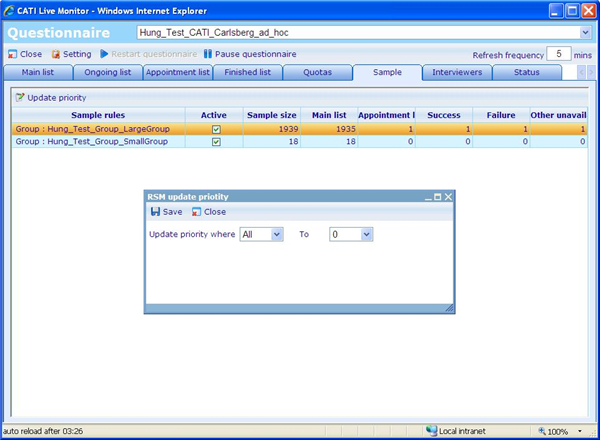More actions
No edit summary |
|||
| Line 10: | Line 10: | ||
The example above shows how to update priority for the sample rule / sample subset called “Group: Hung_Test_Group_LargeGroup”. | The example above shows how to update priority for the sample rule / sample subset called “Group: Hung_Test_Group_LargeGroup”. | ||
In order to quickly affect the logic of which respondents will be called during an interview, we can activate or deactivate sample rules with immediate effect on the [[ | In order to quickly affect the logic of which respondents will be called during an interview, we can activate or deactivate sample rules with immediate effect on the [[_Next_Call_Logic_/_CATI_settings_|Next Call Logic]]. I.e. when a sample subset is deactivated respondents from these sample subsets will not be chosen in the [[_Next_Call_Logic_/_CATI_settings_|Next Call Logic]]. To do this we simply un-check the active column check box on the sample tab. | ||
Also notice the columns that show the statuses for each sample. Available columns are: | Also notice the columns that show the statuses for each sample. Available columns are: | ||
Latest revision as of 07:22, 12 May 2011
Sample Tab
On the samples tab it is further possible to update priorities for many respondents at a time. In order to quickly affect the logic of what respondents will be questioned next (see Next Call Logic for more information), we can change priorities of single respondents or entire sample subsets located in the main list.
The example above shows how to update priority for the sample rule / sample subset called “Group: Hung_Test_Group_LargeGroup”.
In order to quickly affect the logic of which respondents will be called during an interview, we can activate or deactivate sample rules with immediate effect on the Next Call Logic. I.e. when a sample subset is deactivated respondents from these sample subsets will not be chosen in the Next Call Logic. To do this we simply un-check the active column check box on the sample tab.
Also notice the columns that show the statuses for each sample. Available columns are:
Sample size: Shows the number of respondents in the sub grouping.
Main list: Shows the number of respondents of the sub grouping who have yet not been contacted.
Appointment list: Shows the number of appointments made with respondents in the sub grouping.
Retry list: Shows the number of respondents we tried to call but did not reach, but which we plan on trying to call again.
Success: Shows the number of successfully completed interviews.
Failure: Shows the number of interviews that were not completed and where we will not contact the respondents again.
Other unavailable: All those answer sheets belonging to users who are disabled or who do not have phone numbers and will thus not be called in connection with the CATI work.

